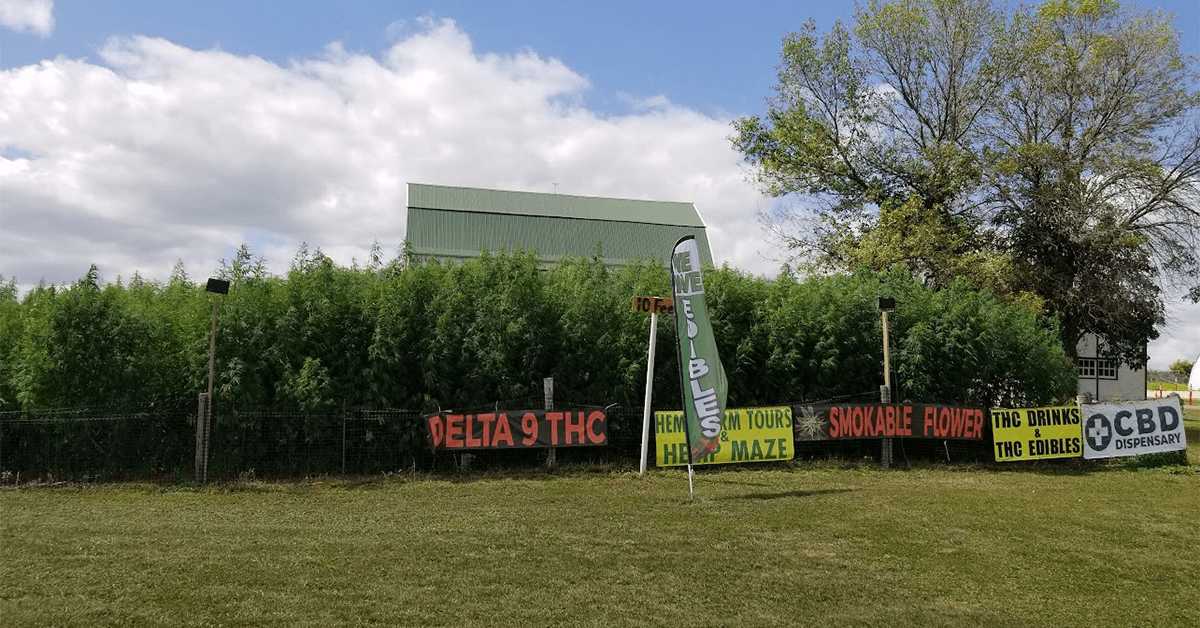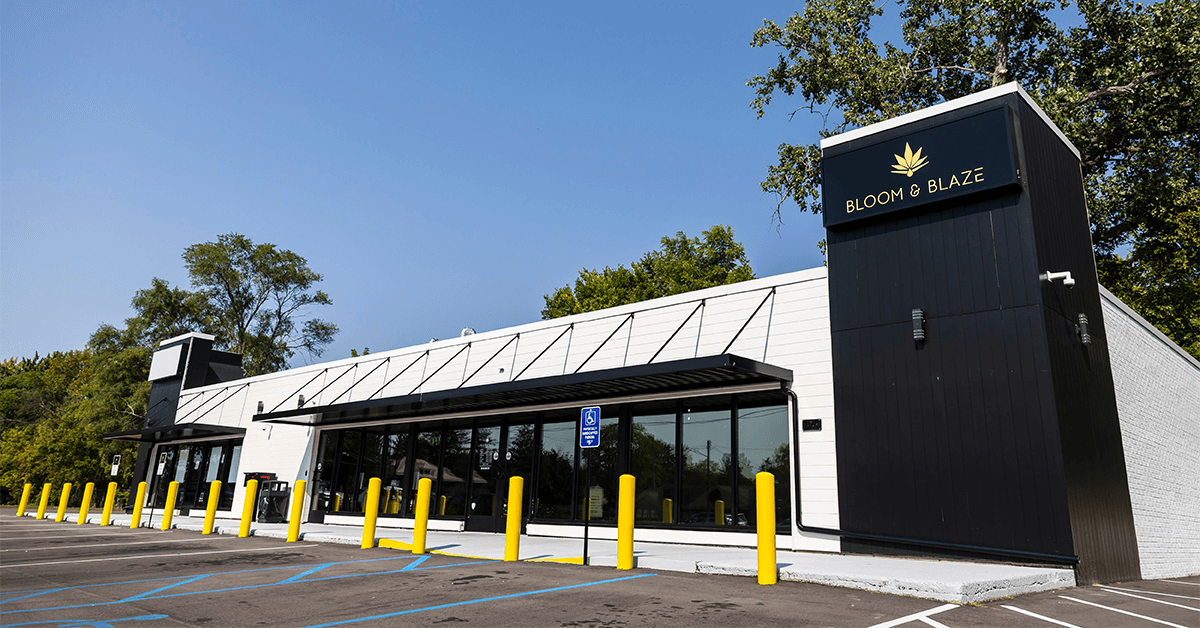Acme Township Rejects Cannabis Facility's Bid for Non-Medical License

Acme Township's cannabis regulations are unlikely to change, despite a recent appeal from the township's sole licensed grow facility. Trustees reaffirmed their stance against expanding cannabis operations during a meeting on Tuesday, following a request from Omeena Farms to secure a non-medical license in addition to its existing medical cannabis cultivation permit.
Brandon Cohen, Managing Member of Omeena Farms, addressed the board and explained that acquiring a non-medical license would provide more flexibility and financial stability for the Bates Road facility. Currently, the farm cultivates 3,000 plants under its two medical licenses and sells its output to another grower downstate that holds both medical and non-medical licenses. Gaining a non-medical license would enable Omeena Farms to directly sell into Michigan's recreational cannabis market.
Cohen added that securing a non-medical license is vital for the business's viability until federal cannabis reform, which could result in a reclassification of cannabis from its current Schedule I status to Schedule III. Such a move would likely impose increased regulation on medical cannabis, making it more valuable in the long term.
"We are trying to float and get by until medical marijuana comes back into what we believe it will be, which is regulated by the FDA," Cohen said.
However, Supervisor Doug White and other trustees reiterated their opposition to allowing recreational cannabis businesses in Acme Township. Multiple residents also voiced their concerns during public comments, noting existing complaints related to odor and outdoor lighting issues at the Omeena Farms facility.
Public and Industry Reactions
The township's rejection drew criticism from some industry experts, including Don Bailey, a retired Michigan State Police trooper and former member of the state's now-defunct medical marijuana licensing board. Bailey argued that the downturn in Michigan's medical cannabis market was predictable, citing the rapid decline in patient numbers from 330,000 to 90,000 since the state legalized recreational use in 2018.
"Nobody should be able to say that they didn't see this coming," Bailey said.
Cohen countered that while he anticipated a shrinking market, the decline in medical cannabis sales in Michigan has been more severe than expected. He had projected the state's medical market would stabilize at around 3% of the size of the recreational market, a figure that aligns with trends seen in other states, but Michigan's contraction has outpaced this estimate.
Ongoing Concerns Over Facility Compliance
Township Planner Lindsey Wolf noted that her department received 14 complaints related to odors at Omeena Farms since February. Cohen acknowledged that more could be done to address the issues and reported that the facility recently invested $12,000 in improved filtration systems. He argued that expanding into non-medical cannabis would provide the necessary funds to further enhance operations and minimize community concerns.
Despite these assurances, trustees remained firm on their position. The board's decision leaves Omeena Farms constrained under its current licensing structure, limiting its ability to access the state's larger recreational market.
Michigan Supreme Court Considers Whether Cannabis Odor Justifies Vehicle Searches

The Michigan Supreme Court is considering whether the smell of cannabis can still provide grounds for vehicle searches, now that the substance is legal for adult use in the state. During oral arguments on Tuesday, justices grappled with the implications of legal cannabis possession and its interaction with law enforcement protocols. The debate centers on whether the smell alone constitutes sufficient evidence of illegal activity, such as impaired driving or unlawful public consumption.
This issue arose from the case of Jeffery Scott Armstrong, who faced weapons charges after police officers searched his car solely based on detecting the smell of cannabis. The lower courts, including an appellate panel, had dismissed the charges, finding that the odor of cannabis, without more, did not establish probable cause for a search.
Case Background: Weapons Charges and Cannabis Odor
The incident occurred when police officers approached Armstrong's vehicle, which was parked in a public area, and claimed to have detected the scent of cannabis. After removing Armstrong and his companion from the car, officers discovered a firearm. Armstrong, who was not licensed to carry the weapon, was charged with multiple weapons offenses. He argued that since recreational cannabis use became legal in Michigan in 2018, its smell should no longer serve as the sole basis for a search or detention.
However, cannabis use in public places and its consumption while operating a vehicle remain illegal, prompting debate over whether officers are justified in investigating cannabis odors emanating from vehicles under these circumstances. Justice Brian K. Zahra raised this point, comparing it to the U.S. Supreme Court's Terry v. Ohio decision, which permits officers to conduct limited searches if they have a "reasonable suspicion" of criminal activity—an evidentiary standard lower than probable cause.
Debate Over Reasonable Suspicion vs. Probable Cause
Justice Zahra argued that a strong cannabis odor could indicate current illegal use, warranting further investigation. He even suggested that it is possible to differentiate between recent and older cannabis smells, stating: "I can tell the difference between an old odor of marijuana and a very fresh odor of marijuana. I don't think it takes an expert to figure that out."
Andrew C. Sullivan of the Neighborhood Defender Service of Detroit, representing Armstrong, countered that the presence of a cannabis odor is not reliable evidence that the drug was being used illegally at that specific moment. Sullivan emphasized that cannabis scents can linger on clothing and upholstery for extended periods, making it challenging to pinpoint the time of use or even whether the vehicle occupants were the ones consuming it.
Judicial Concerns and Legal Nuances
Other justices raised questions about the broader implications of using cannabis odor as a basis for searches. Justice Elizabeth T. Clement asked Sullivan what additional factors might constitute reasonable suspicion if smell alone is insufficient. Sullivan suggested that visible evidence, such as a lit joint or clear signs of driver impairment, would be necessary indicators of ongoing illegal activity.
Justice Megan K. Cavanagh expressed concern over whether legal cannabis use in private settings should be treated differently than other activities, such as possessing alcohol, where legality hinges on context. "How can completely legal conduct give you reasonable suspicion of illegal conduct?" she asked, highlighting the complexities of distinguishing between lawful and unlawful cannabis use based solely on scent.
Law Enforcement's Position: Balancing Legal and Illegal Use
Jon Wojtala, representing the Wayne County Prosecutor's Office, argued that officers should be allowed to investigate a situation if there is a reasonable suspicion of criminal behavior, even if an innocent explanation is possible. Wojtala suggested that a strong cannabis odor directed toward a specific vehicle or individual might justify further investigation. However, Justice Clement questioned the practicality of officers discerning whether a smell originated from recent use or was merely residual.
ACLU's Perspective: Higher Standards Needed for Civil Infractions
The American Civil Liberties Union (ACLU) of Michigan, participating as a friend-of-the-court in support of Armstrong, argued that reasonable suspicion should not justify searches when the suspected violation is only a civil infraction. The ACLU's Ramis J. Wadood emphasized that under Michigan law, public cannabis use is a civil infraction, while driving under the influence is a criminal offense. He argued that the higher standard of probable cause should apply when officers suspect a civil infraction rather than a crime.
Justice David F. Viviano raised concerns that the ACLU's position would prevent officers from acting on circumstantial evidence, even when it suggests a crime might be occurring. He pointed out that if police need to catch someone in the act of consuming cannabis to justify a search, it could significantly hinder enforcement.
Legal Developments in Other States
The Michigan justices are examining the issue in light of evolving legal interpretations in other states. Just days before the Michigan Supreme Court hearing, the Illinois Supreme Court ruled that the smell of burnt cannabis alone is not sufficient to justify a warrantless vehicle search. Since the legalization of recreational cannabis in Illinois in 2020, courts there have sought to clarify the limits of police authority in similar contexts.
Next Steps for Michigan's High Court
Armstrong's weapons charges were initially dismissed after the Wayne County Circuit Court judge suppressed the evidence on Fourth Amendment grounds. The Michigan Court of Appeals upheld the decision in 2022, leading the Wayne County Prosecutor's Office to seek review by the state's highest court. The Michigan Supreme Court's decision could have significant implications for how cannabis-related searches are conducted statewide.
The case was heard during a special session at Northern Michigan University in Marquette, part of the court's Community Connections program aimed at increasing public engagement with the judicial process.
Mason Residents to Vote on Recreational Cannabis Dispensaries in November

When Michigan voters approved the legalization of recreational cannabis in 2018, Mason was one of roughly 1,300 municipalities that chose to prohibit sales within its borders. Now, more than five years later, the small city might finally reverse that decision if residents vote to allow two dispensaries to be licensed this November.
The Michigan cannabis industry has expanded rapidly since legalization, reaching $3 billion in total sales last year. By opting out of permitting local dispensaries, Mason missed out on a portion of the revenue distributed through the state's cannabis excise tax. Had the city opted in last year, it would have received over $118,000 in tax-sharing funds, which continue to grow annually.
How the Ballot Measure Came About
The City Council decided to put the issue to a public vote this past July, spurred in part by external pressure. Mayor Russell Whipple noted that attorneys have contacted the city twice in the last two years to encourage adding a cannabis-related measure to the ballot. The most recent push came in December 2022, when Ypsilanti-based lawyer Anderson Grandstaff informed the Council of his plans to begin a petition process to force the issue if the city did not act.
In response, the Council chose to proactively draft its own ordinance and ballot language. "We concluded that it wasn't a bad idea to let the people decide," said Whipple. "If the residents agree, we'll move forward with drafting an ordinance, and the Council will consider adopting it."
The Council introduced the ballot language in March, and by July 15th, members voted unanimously to place the measure on the November ballot. Whipple explained that working with Grandstaff on crafting the language allowed Mason to maintain some control over the process. "If we were going to do this, we thought it would be better if we wrote it ourselves to ensure there's consistency," he said. "We wanted to have some semblance of control over what the law would say."
Potential Impacts and Implementation
If the measure is approved, the next step would involve updating local zoning ordinances to define where dispensaries could be located. "We'll need to thoroughly review our zoning to see which areas would be suitable for cannabis businesses," Whipple explained. "But we won't invest too much effort until we know that residents want this."
There's reason to believe the proposal may pass. In 2018, 57% of Mason voters supported legalizing recreational cannabis—slightly higher than the 56% state average. Given this, local advocates like Miles Mendoza are optimistic. Mendoza, a Mason resident and cannabis industry employee, attended the Council's July 15th meeting to voice his support for the proposal and to urge the city to prioritize local hiring if the measure passes.
"Cannabis businesses can have a positive impact if they're run by people who invest in the community," Mendoza said, emphasizing that many facilities outside Mason employ a high percentage of local residents. He also suggested the city consider allowing cannabis cultivation operations, noting that the proposed ordinance currently only addresses retail dispensaries.
Opposition Voices Concern Over Community Impact
Not all Mason residents are on board. Trish Walley, a resident since 2020, plans to vote against the proposal. "I moved here partly because there are no dispensaries in Mason," said Walley, who is in recovery. "You already smell it everywhere. We don't need it on every block like in Lansing."
Walley argued that the city should focus on attracting businesses that would contribute to the community in other ways, such as a new grocery store or other services that align with the town's "family-oriented" values. "If people want cannabis, they can go to places where it's available," she said.
Next Steps if Approved
Should the measure pass in November, the city could begin the process of revising zoning and accepting dispensary license applications by early next year. "There's still a lot to work out," Whipple cautioned. "We want to approach this carefully, taking into account feedback from both supporters and those who have concerns."
The outcome will likely be influenced by how well the proposal is communicated to residents leading up to the vote. If passed, Mason would join a growing list of municipalities choosing to benefit from the expanding cannabis market and the potential revenue that comes with it.
Could a Cannabis Maze Be Michigan's Next Big Halloween Hit?

With Halloween just around the corner, many Michiganders are gearing up for the season—decorating their homes, planning costumes, and mapping out parties. But beyond the traditional festivities of trick-or-treating and haunted houses, there's an entire culture of fall activities that have become closely associated with Halloween, like pumpkin patches, apple orchards, and corn mazes.
Now, Minnesota has added a new twist to these seasonal staples with the nation's first haunted cannabis maze. Instead of weaving through towering corn stalks, visitors navigate through fields of cannabis plants. It's a novel attraction that fuses Halloween thrills with the growing cannabis industry, and it raises an interesting question: could Michigan be next to embrace this trend?
Michigan is already a major player in the cannabis world. Since legalizing recreational cannabis in 2018, the state has seen significant economic growth tied to the industry, with new dispensaries and cultivation facilities springing up across the state. With Michigan consistently ranking among the top states for cannabis consumption, introducing a cannabis maze—haunted or not—seems like a natural fit.
The cannabis maze in Minnesota taps into two growing trends: immersive, interactive experiences and the increasing acceptance of cannabis as part of everyday life. As cannabis becomes more integrated into culture, it makes sense that farms would explore creative ways to connect with their communities, especially during the fall season when people are seeking unique, festive activities.
While Michigan hasn't announced any plans to replicate Minnesota's haunted cannabis maze, it's not hard to imagine it being a hit here. The state's numerous cannabis farms could easily offer similar attractions, blending the excitement of Halloween with the novelty of a cannabis-themed experience. Whether or not the maze would be haunted, the opportunity to explore fields of cannabis plants could be a draw for both cannabis enthusiasts and those simply looking for something new to do this fall.
Would a haunted cannabis maze take off in Michigan? The answer is likely yes. With the state's robust cannabis culture and appetite for unique attractions, such an event could quickly become a popular fall activity. Whether you're looking for a spooky adventure or simply an excuse to spend an afternoon in the crisp autumn air, a cannabis maze could be a new way for Michiganders to celebrate the season.
So, would you try to navigate a cannabis maze in Michigan, or would you stick to the more traditional fall activities?
New Partnership Aims to Streamline Cannabis Delivery in Southwest Michigan

In a recent move within Michigan's cannabis industry, LeafLink and Cannadelivery have partnered to enhance cannabis delivery services in Southwest Michigan. The collaboration seeks to make the delivery process more efficient, ensure compliance with regulatory requirements, and improve the overall customer experience. LeafLink's logistics technology combined with Cannadelivery's local market knowledge aims to create a more reliable and streamlined service for both cannabis businesses and consumers in the region.
Boosting Delivery Efficiency
This partnership aims to improve the efficiency of cannabis deliveries for businesses in Southwest Michigan. LeafLink, known for its B2B platform, brings sophisticated logistics solutions that streamline order fulfillment. Key features include real-time tracking, route optimization, and automated compliance checks, all of which contribute to smoother, faster, and legally compliant deliveries.
Cannadelivery, with its deep understanding of local market dynamics, complements these technological tools by offering expertise in customer service and local operations. The integration of LeafLink's platform with Cannadelivery's local presence aims to reduce delivery times and increase service reliability, offering tangible benefits to both businesses and end consumers.
This partnership also addresses persistent operational challenges for cannabis businesses, such as inventory management and order tracking. Through LeafLink's platform, businesses gain access to data analytics and reporting features, enabling more informed decision-making and better service management. These tools help cannabis companies enhance their operations, ensuring more reliable deliveries and higher customer satisfaction.
Enhancing the Customer Experience
A key focus of this partnership is the improvement of the consumer experience in Southwest Michigan's cannabis delivery market. By offering features such as real-time order tracking and flexible delivery options, the collaboration seeks to provide a more convenient and reliable service. This added transparency can increase consumer confidence in the delivery process and promote customer loyalty.
Cannadelivery's local expertise plays a central role in shaping the customer experience, allowing the service to cater to the specific needs and preferences of the Southwest Michigan market. By combining this local understanding with LeafLink's advanced logistics, the partnership aims to create a more responsive and user-friendly delivery service. For consumers, this means faster, more reliable deliveries and a better overall shopping experience.
Ensuring Regulatory Compliance and Safety
Compliance remains a critical concern in the cannabis industry, and the LeafLink-Cannadelivery partnership places a strong emphasis on meeting Michigan's regulatory standards. LeafLink's platform offers automated compliance features that help ensure deliveries are conducted within the bounds of state law. These features include verifying customer age, tracking product movement, and maintaining detailed records for legal audits.
Additionally, Cannadelivery's knowledge of local regulations and enforcement practices further strengthens compliance efforts. The partnership aims to meet both state and local delivery requirements, using secure transportation methods and providing compliance training for delivery personnel. Safety protocols such as tamper-evident packaging and secure delivery processes are also in place to protect both the integrity of the products and the security of the delivery teams.
By focusing on compliance and safety, the partnership sets a high standard for cannabis delivery operations in Southwest Michigan, seeking to ensure that all deliveries are legal, secure, and efficient.
Saginaw's Newest Dispensary, Bloom & Blaze, Shines with Women at the Helm

A new recreational cannabis dispensary, Bloom & Blaze, has opened its doors in Saginaw, aiming to offer an enhanced customer experience. Located at 1724 E. Genesee Ave., the dispensary is co-owned by local entrepreneurs Laquanda Hoskins and Letisha Randle, who are expanding their business ventures in the region.
In addition to their work with Bloom & Blaze, Hoskins and Randle manage two other businesses, PRH Group and I Heart Mac and Cheese, also based in Saginaw. Randle emphasized that their businesses are rooted in community improvement, noting, "We strive to find things that help our community because we definitely have strong ties in the Saginaw area."
Bloom & Blaze's storefront features a modern design with a welcoming atmosphere. Upon arrival, customers are greeted by staff who guide them through a personalized shopping experience with the help of knowledgeable budtenders. The dispensary places a strong emphasis on educating both its employees and customers, ensuring that individuals receive comprehensive information about the products and their potential benefits.
The owners have put significant thought into the dispensary's aesthetic and community presence. According to Randle, "We really wanted to provide something different from what we've seen out there as far as cannabis dispensaries," highlighting their focus on education, engagement, and community beautification.
One of the goals of Bloom & Blaze is to address misconceptions surrounding cannabis use. Hoskins remarked that they aim to educate customers not only about recreational uses but also potential health benefits, such as pain relief. They also highlight how cannabis may assist with specific health issues, including menstrual discomfort.
Inside the dispensary, customers can find a wide array of cannabis products, including flower, edibles, concentrates, pre-rolls, topicals, and unique items like cannabis-infused cereal. Hoskins and Randle are committed to providing a diverse selection, catering to both new and experienced consumers.
By establishing Bloom & Blaze, Hoskins and Randle continue to contribute to Saginaw's business landscape. Their efforts are driven by a desire to create value for the community and combat negative stereotypes surrounding cannabis.


 Helpful Links
Helpful Links